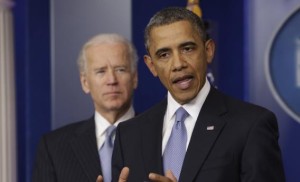Obama : Congress should make “fiscal cliff” deal
 In an attempt to avoid the quickly approaching fiscal cliff at year’s end, President Obama curbed his legislative aspirations, and implored Congress to take stopgap measures in order to continue benefits to unemployed workers and prevent a rise in federal income taxes for those individuals making less than $250,000 per year.
In an attempt to avoid the quickly approaching fiscal cliff at year’s end, President Obama curbed his legislative aspirations, and implored Congress to take stopgap measures in order to continue benefits to unemployed workers and prevent a rise in federal income taxes for those individuals making less than $250,000 per year.
By implementing the plan, groundwork should be laid for actions in the upcoming year to encourage economic growth and bring the national debt under control, according to President Obama at a White House news conference. Unfortunately with federal income taxes set to increase for every American in a matter of days, President Obama admitted that time is just too limited to put into place far-reaching legislation.
Only a day previous to this statement, House Republicans declined an alternative federal income tax advanced by Speaker of the House John Boehner which would have prevented any increase to federal income taxes for those making less than one million dollars a year. It was shot down by conservative who hesitated at the prospect that federal income taxes would rise for approximately 400,00 households.
If a bill were to pass with a threshold of $250,000, federal income taxes would go up for about 3 million American families. Although a compromise between President Obama and Speaker Boehner is most critical for moving talks forward, Senate Democrats said theywould be willing to take on a bigger role in the talks.
Democrats also said they would seek to postpone the spending cuts which would affect the federal agency budgets in the coming month. Both the Democrats and Republicans also want to avoid the alternative minimum federal income tax which would affect millions of new taxpayers this April.
Categories: Federal Tax, Income Tax, Tax Law Tags: federal income tax, federal tax, fiscal cliff, income tax
Payroll taxes are set to rise
 Capitol Hill- Looks like whether or not we plunge off the fiscal cliff won’t matter for some tax hikes. It looks as if come hell or high water payroll taxes are set to rise once again.
Capitol Hill- Looks like whether or not we plunge off the fiscal cliff won’t matter for some tax hikes. It looks as if come hell or high water payroll taxes are set to rise once again.
The payroll tax cut, which has been in effect for the past two years will expire this forthcoming Monday. No talks are underway to even begin thinking about modifying this or changing the fate of this expiring tax cut. On a similar note the fiscal cliff is set to begin next week as well. Unfortunately it looks like no negotiations will be had to resolve this issue and 500 billion in combined tax increases and spending cuts will take into effect next week.
This expiration will result in every single worker seeing their paychecks shrink by over 1,000 dollars next year for individuals making 50,000 a year. The rate will go from 4.2% to 6.2% and benefit Social Security.
These tax increases will take this money out of the economy and have a certain impact on growth of the US economy next year. This will take out of the economy 113 billion dollars or roughly .7% of the annual US output. This will have some impact on the US economy next year seeing as how we have seen sluggish growth for the past few quarters of around 2%.
“They certainly weren’t too keen about publicizing that a lot of money was about to disappear,” said Nigel Gault, chief U.S. economist at IHS. “It will be a surprise to a lot of people that they’ll have less to spend and they’ll have to adjust.”
It seems as if families are already taking into consideration these cuts as individual families this year spent on average 100$ dollars less than in previous years. This is quite strange behavior seeing as how we are supposedly out of the recession.
These families will be in for a surprise that will take into effect almost immediately. Most middle class families have a hard time paying the bills and live paycheck to paycheck. It is yet to be discovered as to how these tax increases are set to effect these folks.
According to a recent survey 2 in 5 houses live paycheck to paycheck. This is much higher than in recent years according to the Consumer Federation of America and the Certified Financial Planner Board of Standards.
These pay cuts are also expected to drop the savings rate of individuals because of the decrease of money into the economy.
Originally this payroll tax cut was put into effect in order to stimulate the economy in 2010. In recent times 2001 and 2008 the government actually sent checks to individuals in order to stint a recession.
Only time will tell whether or not this needed tax break will fade otu of existence with minimal effects to the economy or if the US government will slip back into a recession because of the cut of this sorely needed tax break.
Categories: Federal Tax, Income Tax, Tax Law Tags: federal income tax, federal tax, federal tax fraud, fiscal cliff, income tax, payroll tax cut
Chiropractor Guilty of Federal Tax Evasion
 Rockford – Cevene Care Clinic owner was found guilty for federal income tax evasion last December 21, 2012.
Rockford – Cevene Care Clinic owner was found guilty for federal income tax evasion last December 21, 2012.
Todd R. Cevene, 42, owner of Cevene Management Group, Inc., Ceven Enterprises, LLC, and, Todd laska Asset Preservation Trust, pleaded guilty for intentionally evading payment of federal income tax. In his plea agreement, he divulged that he has been transferring income from Cevene Care Clinic to his other companies in 2004. He further elaborated that the amassed money were then used to pay for personal expenses knowing that those payments would be improperly used as business expense deductions on entities’ federal income tax returns.
Also in the agreement, he confessed of having most of the money to be transferred directly to his personal account which were not included as income on his personal federal income tax returns.
Cevene admitted that his purpose for transferring the funds to his account was to minimize the risk of exposing his attempts for tax evasion. It has also been found that he made more than one transfer between accounts to make it less suspicious.
Finally, Cevene wrote in the agreement that he owes a large amount of federal income tax for 2004 that he failed to report or pay accordingly. He continued his tax evasion for another 3 years accumulating a total of $91,568 under payment of federal income tax.
Cevene was charged last December 14, 2012 and is scheduled to be sentenced on April 2, 2013. If found guilty, he could have up to five years jail time, with around three years of supervised release after imprisonment and a fine of up to $250,000 plus $500 prosecution costs.
Categories: Federal Tax, Income Tax, Tax Evasion Tags: avoiding taxes, federal income tax, federal tax, federal tax fraud, income tax, tax crime, tax evasion, tax fraud

